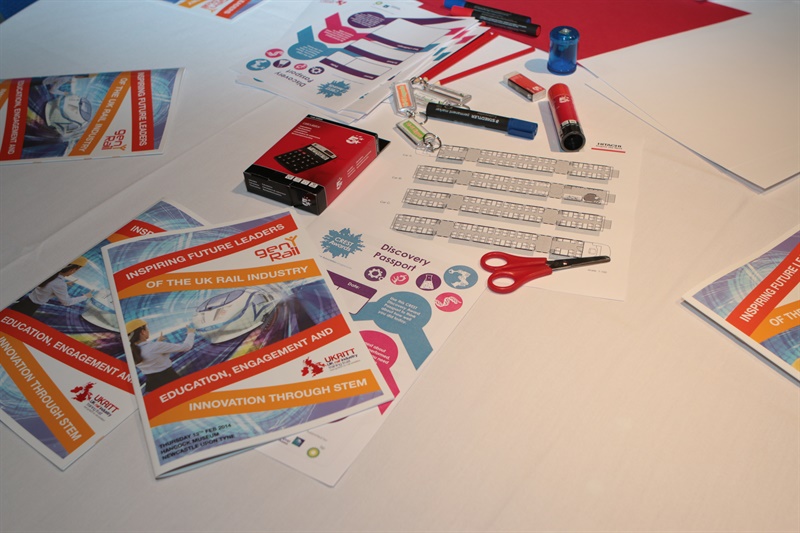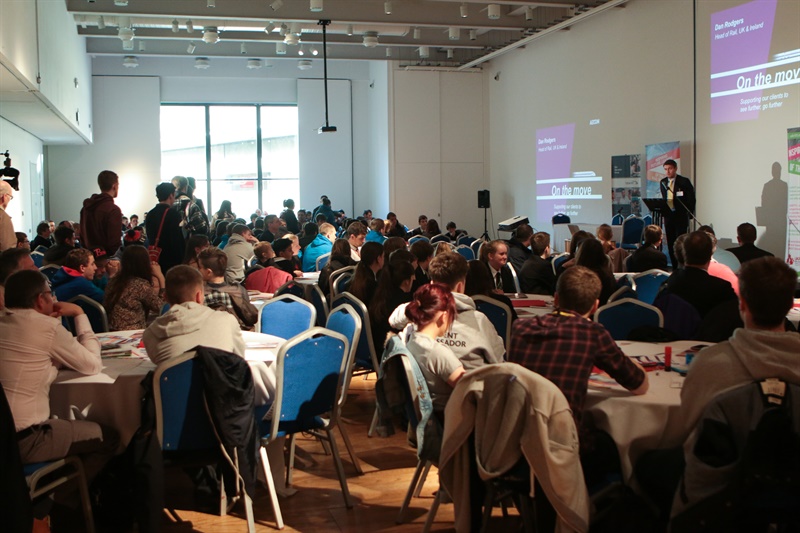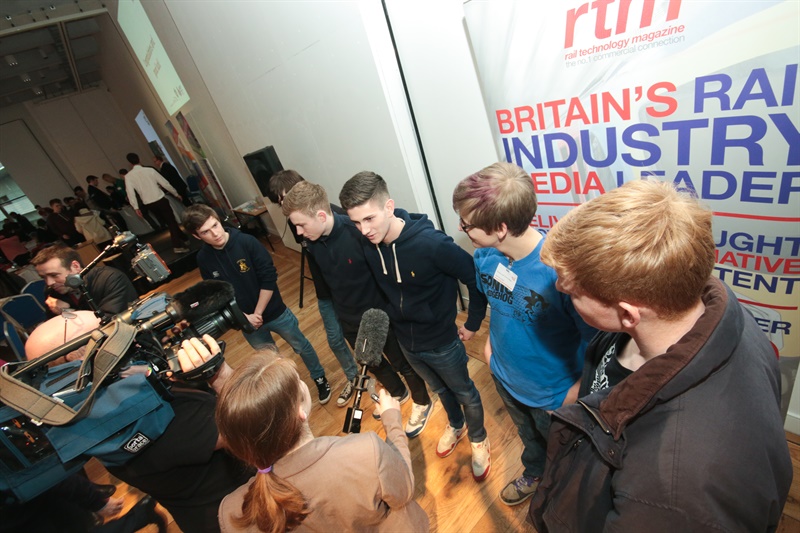14.03.14
Inspiring the next generation of railway engineers
Source: Rail Technology Magazine Feb/Mar 2014
UKRITT’s education and engagement programme for young people, Gen Y Rail, began its series of
regional competitions in the North East. Kate Ashley reports.
For a long time the rail industry has been talking about the need to get more young people interested in a career in the railway. For too many, ‘rail’ does not inspire the connotations of opportunity, challenge and success that those inside the industry can stand
testament to.
And too often, media reports of rail focus on things breaking, rising fares and delayed trains. There’s so much more to the industry
than this, and together we can start to change the public perception of rail. It’s urgent: the widening skills gap threatens to crumple our capability just at the moment when the workforce is most in demand.
Gen Y Rail
One way Rail Technology Magazine hopes to help this cause is through the series of Gen Y Rail events, organised by our charity – the UK Rail Industry Training Trust (UKRITT). Gen Y Rail seeks to engage young students in rail, showcasing the wonderful career opportunities available, and promoting training and apprenticeship schemes aimed at the next generation of rail professionals.
The first Gen Y Rail event took place in Newcastle, at the Great North Museum: Hancock, on 13 February 2014. More than 150 students from seven schools and six colleges came together to compete on a railway challenge, and to learn more about different career opportunities in the rail industry.
The north east leg of the national competition brought industry professionals into direct contact with the next generation of recruits, to start to address the future skills gap in rail. There will be a series of these regional events over the coming months, culminating in a national final to be held at Network Rail’s Westwood facility in Coventry on 25 June.

Expert help
Exhibitors and rail industry volunteers were on hand in Newcastle to answer students’ questions about the railways, to give advice on future career choices, and to explain how they themselves got into rail.
Mission Room technology was also on display, allowing students the chance to see the railway in action with a 360-degree perspective. Its 3D modelling capabilities are already in use by Network Rail to improve safety when planning possessions, but can be applied in a number of different ways. One student commented: “It’s like nothing I’ve ever seen before!” Older members of the audience were no less eager to have a look inside.
A series of presentations by young people working in the industry provided further inspiration, and each team had a mentor to help them with the engineering challenge. Students were tasked with designing a new train that would transport staff, students and an artefact from the museum up to Edinburgh.
Thinking outside the box
Some of their solutions were funny and some were insightful, but all the students demonstrated an ability to think critically about the problem and come up with some innovative answers.
Network Rail described some of the students’ designs as “eclectic” but added: “There are some budding engineers in the making.”
Richard Merrills, from SigAssure, agreed that the children’s suggestions could be “wild”. But he said: “In reality, most of them are not far off where we need to be. How we get there is another challenge of course – whether it’s feasible or costs too much money is a different question – but everything I’ve heard does align with where the industry wants to go.”
Some teams came up with trains driven by technology, not people – perhaps a pertinent note of things to come for the industry. Other interesting suggestions included an emphasis on solar power, disabled access, and electric traction.
Following their presentations, the Dragons’ Den-style panel of judges picked four winners based on the effectiveness, cost and ingenuity behind their ideas, as well as their ability to communicate that as a team.
Two winners were picked from the school-age teams, and two from sixth-form and college-aged students (See box out).
CREST discovery
Students achieved a CREST Discovery award for their hard work, courtesy of the British Science Association (BSA). The CREST scheme seeks to reward school and college-aged pupils for their project work, and the Discovery award is the first in a series of awards they can work towards with the BSA.
David Rogers, from the STEM advisory network for Tyne and Wear, explained what the students were working towards:
“The idea behind CREST is that it rewards students for project work that they do, either project work that they do, either within school or at events like this. Today they’re doing CREST Discovery, which is like an introductory level to CREST – they can go on from that and do Bronze, Silver or Gold.”
STEM subjects are vital to the infrastructure of modern life and it is important to encourage more young people to consider studying science, technology, maths and engineering. These subjects are “where the jobs are”, Rogers said.
“The students who come through school today, if they come through with STEM skills, then they’re pretty much guaranteeing themselves a job at the end, and a well-paid job quite often.”
He recognised the shortage of students choosing these subjects and going into fields such as the rail industry: “I don’t think young people do know enough about STEM and engineering; there’s not enough children coming through the educational system to fulfil the jobs that are out there at the moment, let alone in the future.
“We’re looking at a deficit – there are not enough students with the right skills. The only way to tackle that is through events like today, through informing them through STEM ambassadors going into schools and telling children about the jobs and opportunities that are out there.”

Young engineers
College student Alex, 18, said he was keen to see what sort of careers you could do in the railway and which pathways you could take to get there.
“I definitely want to work in the railway. There’s all sorts to get involved with, seeing what there is to get started on. I’m hopefully looking for an apprenticeship; I’ve studied A-level engineering at college.”
The HMS Junior Engineers team, from Heaton Manor School, were excited to start the challenge, and were competing against the sixth-form team who had come along with them.
Gabriella, 14, said: “I think it’ll be really interesting to see what ideas we come up with and to see what other people do as well, for inspiration. It’ll be an experience.”
The other girls said they had come along as they were interested in science, technology and engineering, and were confident they had some good ideas for the challenge.
They were later commended by the judges for their work.
RTM also spoke to the teacher of one of the winning teams, Trainiacs, from Stockton Sixth Form College. She said: “I am so proud of them! I think they did work very well together and came up with some amazing ideas.
“It’s been fantastic – we brought two teams and both teams absolutely loved it.”
Safe and successful
A series of presentations showcased a range of different pathways into a career in rail, from apprenticeships to engineering degrees, and work experience on track.
There were similar themes across their talks: to study what you enjoy, try to grasp opportunities as they arise, the importance of a range of different roles and sectors, and staying passionate about your work.
Dan Rodgers, head of UK rail at AECOM, told students that the sheer scale of investment going on in rail at the moment means
“your career is pretty much safe in rail for the next 20 to 30 years.”
The “massive” skills shortage in rail engineering meant there was “a real opportunity for you guys to have a very successful career if you get into this market now”.
Skills achieved in rail are transferable and can be used overseas, he added. Another perk that might interest the young people was an uplift of around 20% on the typical salary of a non-rail civil engineer.
Rodgers said: “Rail gets a bad press. It’s not seen as the most sexy of the engineering disciplines; you probably associate rail with
guys in orange PPE stood at the side of railway lines. The reality is more exciting than that. Over my career I’ve worked on some of the biggest projects in the UK.”
He urged the young people to look at the apprenticeship and training schemes on offer in rail, many of which were exhibiting at the event.
Do what you enjoy
Amanda White, senior route engineer for HS2, said: “Not a lot of people actually know what it is they want to do in their career. So it’s ok if you don’t know.”
She described the rail industry as “a special place to work”, due to passionate people and huge opportunities. White chose her degree based on the subjects she enjoyed, and picked a placement in industry at Network Rail because it was the nearest to her hometown.
“That was my introduction to the rail industry – it was complete chance that I worked there.” But she said: “For you I don’t want
that to be the case because in the future we’ve got huge challenges, huge programmes of work and we need people like you to get excited about joining the industry.
“The railway is a job for life; once you’re in, you’re hooked and there’s such a wide range of opportunity to move into that you’ll never get bored.”
She added: “We all need to work together as an industry to make sure we’re communicating what the opportunities are – that we’re establishing training schemes that give you the right skills, so you are ready to help us to build things like HS2. We need young people and fresh ideas to ensure that we’re meeting expectations.”

‘This is what we need’
There was huge support for Gen Y Rail from the industry, and both mentors and guests were unanimous in their praise for the event.
Spencer Hufton, safety & compliance manager at South West Trains (SWT), told RTM: “It’s about inspiring young people – these events are important to put that message across.
We need them, we need their ideas. At the moment we’ve got this big gap between mid-40s to late-20s: we need to get people back into the industry.
“It’s not just fixing trains and driving trains, we need people managers as well; that’s one of the hardest things you can actually do. There’s plenty there for them to get their teeth into.”
SWT’s apprentice & competence manager Rob Hulson agreed that there was still a long way to go to get more young people interested in a career in rail.
“The younger we start advertising the fact that we’re an exciting industry, that the prospects are fantastic, hopefully these young engineers, entrepreneurs will take something away from today and think: ‘That’s actually what I want to do! That’s my career path; I really fancy going to work within the rail industry’.
“We don’t do enough and I think we should do more, definitely.”
Speaking of Gen Y Rail, he added: “This is absolutely fantastic. This is the sort of thing we need; to be building partnerships like this, to advertise what we want as a train operating company, and to show these guys the future is with us.”
Sowing a seed
Pete Donovan, Network Rail apprentice programme manager, told RTM: “It’s been really enjoyable. There are some great young people here, there’s a lot of opportunity for them. It’s a good forum for them to engage with the rail community, different training providers, so that hopefully they can have a gainful career in the rail industry.”
On the skills gap in rail, he said Network Rail had identified the importance of more new technicians and their subsequent career development.
“So it’s good to see events like this, which is effectively starting that procedure, to get people into the right career paths so that we can meet the skills shortages. There’s a huge amount of work to be done.”
On whether a younger age group should be targeted, he added: “There is no harm in sowing a seed. It’s good to see those slightly younger secondary school children here today, because to present the opportunity to them at that age will inevitably get them thinking about something more unconventional than what they would consider a normal career looks like.”
Donovan concluded: “The business needs to get better at advertising its successes. Over the last few weeks with the flooding
we’ve seen just how challenging it is to maintain and operate the infrastructure, so we need to get better as an industry at promoting what we’re good at.”
Turning the corner
SigAssure UK managing director, Richard Merrills, told RTM: “I’ve thoroughly enjoyed today, it’s been a long time coming. I think the industry has been asking for something like this for a long time now and I have always been keen to engage with the youth of
tomorrow in terms of the future apprentices and leaders. The whole thing has been fantastic.”
The industry was beginning to work together to get more young people on board, he said, and added that more involvement from local authorities and education providers would be very welcome.
He said: “I think we’re at a crossroads now. The reality is if we don’t keep this going, we’re going to have an industry with no people in it. It’s not a choice.”

For more footage of the day visit our Image Gallery
On Track at Network Rail
Pete Donovan, apprentice programme manager for Network Rail’s Advanced Apprenticeship scheme, described the benefits and opportunities from taking a less-traditional pathway into work.
Network Rail’s scheme runs for three years and offers technical qualifications as well as practical line side work experience. They typically recruit 210 apprentices from all across the UK every year and are currently recruiting for their tenth cohort. There are five engineering discipline pathways on offer: track; signalling; electrification and plant; telecoms; and overhead line.
Donovan said: “What do you get? A gold standard – BTec Level 3 in engineering, NVQ Level 2 and the Institute of Leadership and Management qualification. As technicians, there’s a degree of responsibility you have to have when you’re working. Years 2 and 3 you’ll get a NVQ Level 3 in railway engineering as well as parts of the Institution of Mechanical Engineers and the Institute of Engineering and Technology [qualifications].
“As well as that there is a continuous professional development programme in affiliation with Sheffield Hallam University whereby you can go on to a HNC, a foundation degree, a BEng, MSc and ultimately becoming chartered in about ten to twelve years. We offer a huge amount.”
A different pathway
Yasemin Tezel, project manager at the National Skills Academy for Railway Engineering (NSARE), told RTM that she entered the rail industry with a slightly different background.
“I majored in management and law. Coincidentally I applied for an internship with NSARE for six months in 2011.”
After graduating NSARE got back in touch to say they were working on “a really big project” – the new national rolling stock training academy – and invited her back to help out with it.
Discussing Gen Y Rail, Tezel said: “I think it will give a glimpse of the industry to the kids and with fun activities as well. Usually people think it’s quite boring but actually it’s quite fun; there are a lot of
opportunities.”
It was important for there to be an active challenge, she said, so school-aged students would not find it boring.
“I think kids will go home today and think, ‘Actually, I want to go into the industry’. Or have some sort of work experience later on, which is the most important thing. It’s good to embed it in their minds from a young age.”
On the industry’s role in inspiring the next generation, she added: “It’s very important to get the industry together – if it comes
together than we’ll have more budget. It’s really good to get together because it builds synergy.”
The winners
• ‘On the train of thought’, from Framwell Gate
• ‘Bright Sparks’, from Oxclose Community Academy
• ‘Wild Cats’, from Queen Elizabeth College
• ‘Trainiacs’, from Stockton Sixth Form College
• ‘HMS Junior Engineers’, from Heaton Manor School, also received a commendation from the judges.